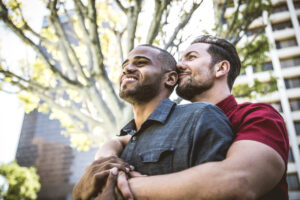
Gay Men and How to Avoid the Pitfalls of Dating
In my long (30 years in 2022) practice in psychotherapy as a specialist in gay male individuals and couples, I see trends that pop up every few months or so. These past couple of weeks have been marked by a trend about single gay men and their trials and tribulations in dating, especially since nationally (and globally) the pandemic restrictions of the past two years have largely been lifted. Guys are “getting out there,” dating again, with all the pros and cons that come with it.
The pros are obvious: you’re having fun. You’re creating a sense of community and fraternity with your gay male peers. You’re possibly meeting someone who could become a serious long-term relationship partner or spouse. You’re getting out of the house after now literally years of “safer at home” messages. You’re enjoying restaurants, concerts, theatre, movies, hikes, shopping, sporting events, festivals, and gay community events.
But I also hear about the downsides, the pitfalls of dating that often (but not always) signal the end of dating this particular person. Here, I’d like to share a list of some of the most common dating pitfalls I hear about, and offer some guidance on how to “adaptively cope” (one of my favorite phrases for “dealing with life”) with them.
In no particular order, they are:
- Prejudice – Whether it’s racism, ageism, internalized homophobia, HIV phobia, ableism, sexism, xenophobia (“fear of foreigners”), anti-Semitism, or something else, being on a date with a guy who demonstrates one of these fear/hate-based traits is demoralizing, off-putting, and disappointing, because it usually means the end of dating that person (or probably should). Gay men, despite being minorities themselves, are not immune from indulging in bigotries against other minorities. When you’re on a date and guy makes an offensive remark about a nearby patron at a restaurant, or the server staff, or whoever, he’s showing you during the “initial basic information collection” phase of dating that he’s probably got some obnoxious prejudices if he’s that offensive on a first date and supposedly on his best/most charming behavior to impress. It’s odd to think of “social justice” in dating, but that’s actually a thing. Hold yourself, and the guys you date, to standards of fairness and equality. Life being partnered or married to some kind of bigot is its own kind of misery.
Coping: Tell your date when he says something offensive. Say something like, if he refers to a nearby person with a slur, “I wouldn’t use that word, but you’re, right, she shouldn’t have cut you off in traffic like that.” Or, “I’m not _____________ myself, but I have friends who are, and they are nothing like you seem to think. I’m offended you use that word.”
 Handling Sexual Expression – In my previous article on the “Six Principles of Sexual Health as Applied to Gay Men,” (here), I reviewed how sexual expression has certain commonly-accepted ethical principles that transcend religions, cultures, and social contexts. But dating a guy can reveal how he handles sexual expression, from the ethical, fun, compassionate, and “hot,” to being an obnoxious almost-predator. If the guy comes on too strong, learn to set boundaries about when to – and not to – agree to sexual play with him, in whatever limits work to keep you comfortable. But if he also has some kind of aversion to sex (or, perhaps more importantly, just sex with you), that’s a problem, too. Look for a balanced sexual expression between him expressing his own needs (which is fair), but also allowing you to express your needs to him, in a reasonably equal balance. Among all this, mutual consent is key. Whatever happens between you sexually, and how soon, should be a mutual decision of shared consent by both/all parties.
Handling Sexual Expression – In my previous article on the “Six Principles of Sexual Health as Applied to Gay Men,” (here), I reviewed how sexual expression has certain commonly-accepted ethical principles that transcend religions, cultures, and social contexts. But dating a guy can reveal how he handles sexual expression, from the ethical, fun, compassionate, and “hot,” to being an obnoxious almost-predator. If the guy comes on too strong, learn to set boundaries about when to – and not to – agree to sexual play with him, in whatever limits work to keep you comfortable. But if he also has some kind of aversion to sex (or, perhaps more importantly, just sex with you), that’s a problem, too. Look for a balanced sexual expression between him expressing his own needs (which is fair), but also allowing you to express your needs to him, in a reasonably equal balance. Among all this, mutual consent is key. Whatever happens between you sexually, and how soon, should be a mutual decision of shared consent by both/all parties.
Coping: Ask for what you want. If you like a guy, even on a first date, and you want to do something sexual with him, tell him. You have the right to ask, but he has the right to “approve, deny, or modify” the proposition. You shouldn’t be made to feel bad for asking to do something consensual with him, and you shouldn’t be made to feel bad for asking not to do something. If sex is going to happen, it’s a creative collaboration between the two (or more) partners involved. Be brave enough to counter-propose something that you’re more comfortable with. And, if he proposes something that you really do want to do, but you’re not sure if you should “allow” yourself to, I say go for it. If you’re both consenting adults, you have a right to do whatever that isn’t illegal or unethical to someone else (and please do not hog the time in a public restroom!). We get so many negative messages these days about sex and the no-no-no routine, but we also have to allow ourselves for the times when “yes” is actually the right answer for all involved.
- Mixed Signals – In my previous article on a syndrome called “approach/avoidance,” (here) I started to discuss how guys can be dating in general, or dating you in particular, and be of two minds about it. They’re on a date with you, but maybe they would rather not be, even at the last minute. They might be attracted to you (physically or emotionally), but be conflicted on whether they feel they really “deserve” a guy like you, so they hold back. Or they are not used to dating a guy like you because you’re older/younger/lighter/darker/different from who they normally date, and they’re not sure they want to change that. Or they were into you at first when you were wearing an outfit they liked, but now that you’ve changed clothes, meh, never mind. Lots of different things can change a guy’s motivations for (or against) dating you, and they can happen suddenly. Often times, we don’t know what it even was, we just know they went from “yes” to “no” or from “no” to “yes,” and now they’re all over you. Mixed signals are crazy-making to you, but to the guy feeling them, the motivations make sense in his world. I think he has an obligation to be honest with you, but many guys aren’t; they just end up being (chicken-shit) avoidance and “ghost” you (my article on that is here).
Coping: Reaffirm that he has a right to change his mind about you at any time, and you have the right to change your mind about him. When I was single, I would dump guys if they stiffed a server or revealed a strong political stance I didn’t agree with. I wasn’t going to spend my life with a cheap racist, I thought, and I stand by that. And I’ve had guys dump me overnight for reasons I’ll never know, and at this point don’t want to know. I just know the answer went from “yes” to “no,” and that’s all you ever need. I’ve also had guys who ignored me for months all of a sudden ask me out and were every bit the fantasy I thought they’d be. People be cray-cray. Good candidates for dating are, in addition to everything else, reasonably consistent and clear in their values, priorities, life goals, ethics, and dating interests. Look for those guys.
 Hung Up on Their Ex – I’ve had this one, and it’s not fun. I always say that in dating, guys need to be reasonably geographically, emotionally, physically, and temporally (meaning their sense of time management) available to you. If you’re some guy’s “rebound date” after he’s just out of a previous relationship, proceed with caution. If your name was “Javi,” and his ex was “Peter,” to him, you’re not really “Javi” yet; you’re the “Anti-Peter” in his mind. If Peter was a cheat, he’ll look for honesty in you. If Peter had a drug or alcohol problem, he’ll watch what you drink/use. If Peter couldn’t hold down a job, he’ll look for job stability in you. And so on. After a breakup, guys need time to emotionally re-set to the “neutral” position. This is especially true with dishonesty; guys who have been betrayed by previous partners who were dishonest might have a big vulnerability to being jealous, controlling, and possessive of you, and on-their-guard about whether you’re going to betray their trust as well, especially when it comes to topics like Consensual Non-Monogamy. And you’re not “Peter.” You have a right to be evaluated based on who you are, as “Javi,” and not who you are in the context of being the opposite of Peter. He owes you that. And if he can’t do that, he needs more time to heal before he’s really emotionally available to date you. And the same thing can happen to a man who has been widowed; you, the real-life person, can’t be expected to compete with some kind of idealized ghost.
Hung Up on Their Ex – I’ve had this one, and it’s not fun. I always say that in dating, guys need to be reasonably geographically, emotionally, physically, and temporally (meaning their sense of time management) available to you. If you’re some guy’s “rebound date” after he’s just out of a previous relationship, proceed with caution. If your name was “Javi,” and his ex was “Peter,” to him, you’re not really “Javi” yet; you’re the “Anti-Peter” in his mind. If Peter was a cheat, he’ll look for honesty in you. If Peter had a drug or alcohol problem, he’ll watch what you drink/use. If Peter couldn’t hold down a job, he’ll look for job stability in you. And so on. After a breakup, guys need time to emotionally re-set to the “neutral” position. This is especially true with dishonesty; guys who have been betrayed by previous partners who were dishonest might have a big vulnerability to being jealous, controlling, and possessive of you, and on-their-guard about whether you’re going to betray their trust as well, especially when it comes to topics like Consensual Non-Monogamy. And you’re not “Peter.” You have a right to be evaluated based on who you are, as “Javi,” and not who you are in the context of being the opposite of Peter. He owes you that. And if he can’t do that, he needs more time to heal before he’s really emotionally available to date you. And the same thing can happen to a man who has been widowed; you, the real-life person, can’t be expected to compete with some kind of idealized ghost.
Coping: If you notice, over time, that the guy you’re dating is not giving you a fair focus because the influence of his relationship prior to you is distracting him, stand up for yourself. Ask your guy if he is truly ready to date again, and decide for yourself if you are willing to wait while he does therapy about the loss. Or, help him, through discussion, to make very conscious differentiations between what you know about his ex (at least from his point of view) and who you are. OK, maybe you ordered a cocktail before dinner, and his ex had an alcohol problem. But it was one cocktail before dinner, it wasn’t like you showed up for your date drunk. You might need to help your new date draw big, thick, Sharpie lines between who you are, and who his ex was. There’s a new Sheriff in town, and his ex is yesterday’s news. If you sense he doesn’t get that, step away until he’s had time to figure that out. If he comes back, and you’re still available (although don’t wait around in the meantime), then maybe he would be ready then. But you deserve his full emotional attention, and you deserve to not have to compete with your Unseen Rival.
 Hung Up on Their Parents – Over so many years in practice, working in Los Angeles and in other cities (via phone or webcam) in coaching with gay men all over the US and world, I’ve seen a representation of many different cultures. And in dating, if you’re dating a guy from a culture different from yours, he might have some interesting views about his own parents. He might not be “out” to parents from cultures even more anti-gay than the United States (although that’s sad to consider). He might culturally have a fear of angering, alienating, or “disappointing” them. He might have a strong obligation to provide care for them, such as if they are elderly, disabled, or poor. Maybe it’s kind of an Anglo-culture bias I have, which I try to own, but I think “adulting” is a thing: there is a time to grow up, cut the apron strings, differentiate from being a child into an autonomous adult, and frankly, grow up. You can love your parents, want to share time with them (holidays, birthdays, Sunday dinner, etc.) but still have your own life. After all, isn’t that what they did, at some point really “launching” from their own parents? If your mother or father wants to control your life, ask yourself, how much do they allow their mother or father to control their life now? My guess is, not much. Let the apple fall pretty far from the tree. This is true for straight men as well; straight men who are hung up on their mothers and not sufficiently reasonably dedicated to their wives (and children) are seen as insufficiently developed. When you are someone’s partner/spouse, you need to be the top priority, and your partner should (in most cases) not be more “loyal” to his parents than to you.
Hung Up on Their Parents – Over so many years in practice, working in Los Angeles and in other cities (via phone or webcam) in coaching with gay men all over the US and world, I’ve seen a representation of many different cultures. And in dating, if you’re dating a guy from a culture different from yours, he might have some interesting views about his own parents. He might not be “out” to parents from cultures even more anti-gay than the United States (although that’s sad to consider). He might culturally have a fear of angering, alienating, or “disappointing” them. He might have a strong obligation to provide care for them, such as if they are elderly, disabled, or poor. Maybe it’s kind of an Anglo-culture bias I have, which I try to own, but I think “adulting” is a thing: there is a time to grow up, cut the apron strings, differentiate from being a child into an autonomous adult, and frankly, grow up. You can love your parents, want to share time with them (holidays, birthdays, Sunday dinner, etc.) but still have your own life. After all, isn’t that what they did, at some point really “launching” from their own parents? If your mother or father wants to control your life, ask yourself, how much do they allow their mother or father to control their life now? My guess is, not much. Let the apple fall pretty far from the tree. This is true for straight men as well; straight men who are hung up on their mothers and not sufficiently reasonably dedicated to their wives (and children) are seen as insufficiently developed. When you are someone’s partner/spouse, you need to be the top priority, and your partner should (in most cases) not be more “loyal” to his parents than to you.
Coping: If it’s a cultural difference, where adult men spend a lot of time with their parents or “do as they say,” then discuss it (for more on gay couples coping with cultural differences, my article on that is here). Advocate for the idea that your life together is your life together, not some kind of three-way with your partner and your partner’s parents. If you find your partner throwing you under the bus (especially a gay partner) to “hide” you from your parents’ friends, colleagues, or other relatives, call him out on it. You are not to be treated as someone’s “dirty little secret” to “save face” in the family. Or to avoid being cut out of a wealthy parent’s will. Make your own money and stand firm that your dignity is not for sale. Cultural differences like this often respond to either couples therapy or relationship coaching, but it’s a deliberate process that takes focus. A culturally-competent, gay-affirmative provider can help you forge compromises that take both cultural points of view into consideration, and compromises in this area (that I’ve seen in my 30 years doing this) do tend to work, if both parties are willing. Even suspicious or resistant parents do tend to accept their “new son in law” over time, especially with repeated exposure. And usually (with rare exceptions), family bonds win out over initial family/parental ignorance or resistance to gay relationships. Everybody learns and grows in the process.
 Overcoming Trauma/PTSD – Guys who are trauma survivors date, too. The number of gay men “out there” dating who either have actual Post-Traumatic Stress Disorder (PTSD) or something very close to it is large. You have to mentally and emotionally “allow” for the possibility that a guy you meet, start dating, and become increasingly involved with has some trauma symptoms that cause either mild inconvenience or outright major disruption to your life. And it could be either one of you. Guys can be violent crime survivors, accident survivors, sexual abuse/incest survivors, combat veterans, AIDS crisis survivors, orphans, refugees, or any number of situations that might (although not in all cases) result in PTSD symptoms. A guy like this might have nightmares when you sleep with him (or even more severe night terrors), he might have odd aversions to certain things that are “triggering” (although this can also be an Autism Spectrum Disorder thing, but that’s a topic for another time), he might have an extra-sensitive startle response, or he might have odd times or stimuli for anxiety. And, he’s likely to keep all these secret until he really gets to know you well enough to disclose why he says or does certain things, having probably learned to be self-reliant after suffering a traumatic loss or betrayal. He might seem a bit guarded or emotionally withholding, like he’s “not that into you,” when actually he likes you a lot, but is taking everything in life slowly and cautiously.
Overcoming Trauma/PTSD – Guys who are trauma survivors date, too. The number of gay men “out there” dating who either have actual Post-Traumatic Stress Disorder (PTSD) or something very close to it is large. You have to mentally and emotionally “allow” for the possibility that a guy you meet, start dating, and become increasingly involved with has some trauma symptoms that cause either mild inconvenience or outright major disruption to your life. And it could be either one of you. Guys can be violent crime survivors, accident survivors, sexual abuse/incest survivors, combat veterans, AIDS crisis survivors, orphans, refugees, or any number of situations that might (although not in all cases) result in PTSD symptoms. A guy like this might have nightmares when you sleep with him (or even more severe night terrors), he might have odd aversions to certain things that are “triggering” (although this can also be an Autism Spectrum Disorder thing, but that’s a topic for another time), he might have an extra-sensitive startle response, or he might have odd times or stimuli for anxiety. And, he’s likely to keep all these secret until he really gets to know you well enough to disclose why he says or does certain things, having probably learned to be self-reliant after suffering a traumatic loss or betrayal. He might seem a bit guarded or emotionally withholding, like he’s “not that into you,” when actually he likes you a lot, but is taking everything in life slowly and cautiously.
Coping: If you see him reacting to something that just feels odd to you, try to reassure him with what you know, like, “Hey I saw a documentary once on trauma survivors who had bad dreams a lot. Have you been through something rough? Tell me whatever you feel comfortable saying about it; I’ll try to understand with your help.” While you should try hard to be patient, compassionate, and understanding, there are limits. If he’s waking you up every night by nightmares and screaming, OK, you can be comforting, but you also might start to insist that he go to therapy to try to reduce trauma symptoms since you have to be up at 5:00 am for work and you need sleep. Sometimes, one partner learning to overcome and heal trauma is a “shared experience” for both partners, particularly the more it affects your everyday life, or things like your sex life. You can have a reasonable expectation that’s he’s doing all he can to heal (not unlike someone with a drug or alcohol problem).
 Alcohol and Drug Issues – Substance issues, unfortunately, are some of the most common and the most toxic problems in gay male relationships I work with. Alcohol is the classic one, and the most common, but others such as crystal meth are prominent, too. I’m fairly progressive on all things sex, drugs, and rock-and-roll, and I believe in and work a lot with guys from the Harm Reduction Model perspective, but I also know when to counsel someone on coming to terms with a substance misuse problem. In an early article, I discussed “the relationship with the bottle” (here) and “getting clean from green” (here), about guys who drank too much or smoked too much marijuana. Another about getting “crystal clear” is here. I realize that Twelve Step programs can be flawed, but I’ve also seen them be very consistently helpful, especially if they are customized to that person’s needs, which they say is “take what you want, and leave the rest.” I also work with guys on Twelve Step alternatives, such as SMART Recovery. Working with individuals on this in therapy or coaching is key, but I also think couples who are experiencing this need their own focus on how a substance issue affects a relationship. The role of the partner who does not necessarily have the substance misuse challenge is key. Al-Anon can be a good resource, but I think couples work helps in a different way. But if you’re dating someone with this kind of problem, it’s not likely to get better very soon. Just like any other challenge that a guy you’re dating might have, anything that makes him less emotionally available to you is going to be a barrier to cultivating any serious relationship.
Alcohol and Drug Issues – Substance issues, unfortunately, are some of the most common and the most toxic problems in gay male relationships I work with. Alcohol is the classic one, and the most common, but others such as crystal meth are prominent, too. I’m fairly progressive on all things sex, drugs, and rock-and-roll, and I believe in and work a lot with guys from the Harm Reduction Model perspective, but I also know when to counsel someone on coming to terms with a substance misuse problem. In an early article, I discussed “the relationship with the bottle” (here) and “getting clean from green” (here), about guys who drank too much or smoked too much marijuana. Another about getting “crystal clear” is here. I realize that Twelve Step programs can be flawed, but I’ve also seen them be very consistently helpful, especially if they are customized to that person’s needs, which they say is “take what you want, and leave the rest.” I also work with guys on Twelve Step alternatives, such as SMART Recovery. Working with individuals on this in therapy or coaching is key, but I also think couples who are experiencing this need their own focus on how a substance issue affects a relationship. The role of the partner who does not necessarily have the substance misuse challenge is key. Al-Anon can be a good resource, but I think couples work helps in a different way. But if you’re dating someone with this kind of problem, it’s not likely to get better very soon. Just like any other challenge that a guy you’re dating might have, anything that makes him less emotionally available to you is going to be a barrier to cultivating any serious relationship.
Coping: Be observant of how your partner relates to alcohol and other substances. See if you can point to actual harm from it. If the guy is canceling plans with you because he’s too involved with a substance, that’s a red flag. So is being so intoxicated around you that you feel alone, even when you’re with him. Try to discern a difference between a fun night out with relatively little harm, and a more serious situation like risking DUI, arrest, or failing to meet responsibilities (like missing work). Accept that while a guy could be great to date in many ways, unless and until he somehow deals with drinking or using too much, a relationship with him is not going to progress through expected growth stages in dating. Wait until he’s really available to you.
 Attachment Issues (Avoidance) – Much has been discussed lately about Attachment Theory and how it affects people’s relationship styles. This theory can be useful, but I think it can be over-used. Guys who have an Avoidant attachment style tend to consistently keep relationships (“attachments’) at arm’s length, out of a sense of self-protection and not getting too close for fear of some kind of hurt. Some therapists really focus on attachment styles of each partner in a relationship, but I always think they have to be put in a certain concrete, behavioral context. Guys tend to fall on a spectrum of relationship styles that run between Enmeshment (being very close, most of the time, like a “fusion”) and Estrangement (where they want a relationship, but they also want a lot of “elbow room” and put a high value on autonomy). Over time, you can probably discern where on that spectrum the guy you’re dating is, and you have to decide if you can accept his style, compared to yours. Couples work can help you “meet in the middle” and find a spot on the Enmeshment/Estrangement continuum, but at a certain point, you have to realize that if you’re too far apart on this, you might not have the basic compatibility that’s needed to form a sound relationship. Part of the dating process, over time, is assessing that overall compatibility on so many points. Good relationships tend to get a high score on that, and dating experiences that fizzle out tend to be lower on that.
Attachment Issues (Avoidance) – Much has been discussed lately about Attachment Theory and how it affects people’s relationship styles. This theory can be useful, but I think it can be over-used. Guys who have an Avoidant attachment style tend to consistently keep relationships (“attachments’) at arm’s length, out of a sense of self-protection and not getting too close for fear of some kind of hurt. Some therapists really focus on attachment styles of each partner in a relationship, but I always think they have to be put in a certain concrete, behavioral context. Guys tend to fall on a spectrum of relationship styles that run between Enmeshment (being very close, most of the time, like a “fusion”) and Estrangement (where they want a relationship, but they also want a lot of “elbow room” and put a high value on autonomy). Over time, you can probably discern where on that spectrum the guy you’re dating is, and you have to decide if you can accept his style, compared to yours. Couples work can help you “meet in the middle” and find a spot on the Enmeshment/Estrangement continuum, but at a certain point, you have to realize that if you’re too far apart on this, you might not have the basic compatibility that’s needed to form a sound relationship. Part of the dating process, over time, is assessing that overall compatibility on so many points. Good relationships tend to get a high score on that, and dating experiences that fizzle out tend to be lower on that.
Coping: Ask yourself, at perhaps some regular intervals in dating, if you just plain feel “compatible” with this guy’s attachment style, communication style, ways of spending time together versus time apart, and his relationship to you versus relationships to other people in his life. The best dating situations just feel “comfortable” in this way.
Perhaps feeling a certain “ease” in dating is one of the simplest, but best, signs. Conversely, feeling a sense of being “uncomfortable” in your gut is a sign that on some level, you are reacting to “red flags” in the dating situation. Listen to those! Sometimes bad relationship situations continue because someone wasn’t listening to that discomfort and didn’t duck out early. Second chances (such as second dates) can be a good idea, especially since guys on first dates might not be at their best if they’re nervous and trying to impress, but third and fourth chances establish a pattern. Good self-esteem means that no matter how long it takes – and I work with plenty of guys for whom it takes, or took, a long time to find someone truly compatible – it’s worth waiting until it just feels right. Don’t let impatience just to be with someone overrule being comfortable. Wait for the guy that makes dating feel easy, even if we know that, ultimately, relationships take work. You deserve nothing less.

If you would like guidance for your specific challenges in the gay dating world, for your relationship, or any quality of life challenge, consider therapy (California residents, where I am licensed) or coaching (everywhere else). Call/text 310-339-5778, or email Ken@GayTherapyLA.com for more information on professional services.


 Handling Sexual Expression – In my previous article on the
Handling Sexual Expression – In my previous article on the Hung Up on Their Ex – I’ve had this one, and it’s not fun. I always say that in dating, guys need to be reasonably geographically, emotionally, physically, and temporally (meaning their sense of time management) available to you. If you’re some guy’s “rebound date” after he’s just out of a previous relationship, proceed with caution. If your name was “Javi,” and his ex was “Peter,” to him, you’re not really “Javi” yet; you’re the “Anti-Peter” in his mind. If Peter was a cheat, he’ll look for honesty in you. If Peter had a drug or alcohol problem, he’ll watch what you drink/use. If Peter couldn’t hold down a job, he’ll look for job stability in you. And so on. After a breakup, guys need time to emotionally re-set to the “neutral” position. This is especially true with dishonesty; guys who have been betrayed by previous partners who were dishonest might have a big vulnerability to being jealous, controlling, and possessive of you, and on-their-guard about whether you’re going to betray their trust as well, especially when it comes to topics like Consensual Non-Monogamy. And you’re not “Peter.” You have a right to be evaluated based on who you are, as “Javi,” and not who you are in the context of being the opposite of Peter. He owes you that. And if he can’t do that, he needs more time to heal before he’s really emotionally available to date you. And the same thing can happen to a man who has been widowed; you, the real-life person, can’t be expected to compete with some kind of idealized ghost.
Hung Up on Their Ex – I’ve had this one, and it’s not fun. I always say that in dating, guys need to be reasonably geographically, emotionally, physically, and temporally (meaning their sense of time management) available to you. If you’re some guy’s “rebound date” after he’s just out of a previous relationship, proceed with caution. If your name was “Javi,” and his ex was “Peter,” to him, you’re not really “Javi” yet; you’re the “Anti-Peter” in his mind. If Peter was a cheat, he’ll look for honesty in you. If Peter had a drug or alcohol problem, he’ll watch what you drink/use. If Peter couldn’t hold down a job, he’ll look for job stability in you. And so on. After a breakup, guys need time to emotionally re-set to the “neutral” position. This is especially true with dishonesty; guys who have been betrayed by previous partners who were dishonest might have a big vulnerability to being jealous, controlling, and possessive of you, and on-their-guard about whether you’re going to betray their trust as well, especially when it comes to topics like Consensual Non-Monogamy. And you’re not “Peter.” You have a right to be evaluated based on who you are, as “Javi,” and not who you are in the context of being the opposite of Peter. He owes you that. And if he can’t do that, he needs more time to heal before he’s really emotionally available to date you. And the same thing can happen to a man who has been widowed; you, the real-life person, can’t be expected to compete with some kind of idealized ghost. Hung Up on Their Parents – Over so many years in practice, working in Los Angeles and in other cities (via phone or webcam) in coaching with gay men all over the US and world, I’ve seen a representation of many different cultures. And in dating, if you’re dating a guy from a culture different from yours, he might have some interesting views about his own parents. He might not be “out” to parents from cultures even more anti-gay than the United States (although that’s sad to consider). He might culturally have a fear of angering, alienating, or “disappointing” them. He might have a strong obligation to provide care for them, such as if they are elderly, disabled, or poor. Maybe it’s kind of an Anglo-culture bias I have, which I try to own, but I think “adulting” is a thing: there is a time to grow up, cut the apron strings, differentiate from being a child into an autonomous adult, and frankly, grow up. You can love your parents, want to share time with them (holidays, birthdays, Sunday dinner, etc.) but still have your own life. After all, isn’t that what they did, at some point really “launching” from their own parents? If your mother or father wants to control your life, ask yourself, how much do they allow their mother or father to control their life now? My guess is, not much. Let the apple fall pretty far from the tree. This is true for straight men as well; straight men who are hung up on their mothers and not sufficiently reasonably dedicated to their wives (and children) are seen as insufficiently developed. When you are someone’s partner/spouse, you need to be the top priority, and your partner should (in most cases) not be more “loyal” to his parents than to you.
Hung Up on Their Parents – Over so many years in practice, working in Los Angeles and in other cities (via phone or webcam) in coaching with gay men all over the US and world, I’ve seen a representation of many different cultures. And in dating, if you’re dating a guy from a culture different from yours, he might have some interesting views about his own parents. He might not be “out” to parents from cultures even more anti-gay than the United States (although that’s sad to consider). He might culturally have a fear of angering, alienating, or “disappointing” them. He might have a strong obligation to provide care for them, such as if they are elderly, disabled, or poor. Maybe it’s kind of an Anglo-culture bias I have, which I try to own, but I think “adulting” is a thing: there is a time to grow up, cut the apron strings, differentiate from being a child into an autonomous adult, and frankly, grow up. You can love your parents, want to share time with them (holidays, birthdays, Sunday dinner, etc.) but still have your own life. After all, isn’t that what they did, at some point really “launching” from their own parents? If your mother or father wants to control your life, ask yourself, how much do they allow their mother or father to control their life now? My guess is, not much. Let the apple fall pretty far from the tree. This is true for straight men as well; straight men who are hung up on their mothers and not sufficiently reasonably dedicated to their wives (and children) are seen as insufficiently developed. When you are someone’s partner/spouse, you need to be the top priority, and your partner should (in most cases) not be more “loyal” to his parents than to you. Overcoming Trauma/PTSD – Guys who are trauma survivors date, too. The number of gay men “out there” dating who either have actual Post-Traumatic Stress Disorder (PTSD) or something very close to it is large. You have to mentally and emotionally “allow” for the possibility that a guy you meet, start dating, and become increasingly involved with has some trauma symptoms that cause either mild inconvenience or outright major disruption to your life. And it could be either one of you. Guys can be violent crime survivors, accident survivors, sexual abuse/incest survivors, combat veterans, AIDS crisis survivors, orphans, refugees, or any number of situations that might (although not in all cases) result in PTSD symptoms. A guy like this might have
Overcoming Trauma/PTSD – Guys who are trauma survivors date, too. The number of gay men “out there” dating who either have actual Post-Traumatic Stress Disorder (PTSD) or something very close to it is large. You have to mentally and emotionally “allow” for the possibility that a guy you meet, start dating, and become increasingly involved with has some trauma symptoms that cause either mild inconvenience or outright major disruption to your life. And it could be either one of you. Guys can be violent crime survivors, accident survivors, sexual abuse/incest survivors, combat veterans, AIDS crisis survivors, orphans, refugees, or any number of situations that might (although not in all cases) result in PTSD symptoms. A guy like this might have  Alcohol and Drug Issues – Substance issues, unfortunately, are some of the most common and the most toxic problems in gay male relationships I work with. Alcohol is the classic one, and the most common, but others such as crystal meth are prominent, too. I’m fairly progressive on all things sex, drugs, and rock-and-roll, and I believe in and work a lot with guys from the Harm Reduction Model perspective, but I also know when to counsel someone on coming to terms with a substance misuse problem. In an early article, I discussed “the relationship with the bottle” (
Alcohol and Drug Issues – Substance issues, unfortunately, are some of the most common and the most toxic problems in gay male relationships I work with. Alcohol is the classic one, and the most common, but others such as crystal meth are prominent, too. I’m fairly progressive on all things sex, drugs, and rock-and-roll, and I believe in and work a lot with guys from the Harm Reduction Model perspective, but I also know when to counsel someone on coming to terms with a substance misuse problem. In an early article, I discussed “the relationship with the bottle” ( Attachment Issues (Avoidance) – Much has been discussed lately about Attachment Theory and how it affects people’s relationship styles. This theory can be useful, but I think it can be over-used. Guys who have an Avoidant attachment style tend to consistently keep relationships (“attachments’) at arm’s length, out of a sense of self-protection and not getting too close for fear of some kind of hurt. Some therapists really focus on attachment styles of each partner in a relationship, but I always think they have to be put in a certain concrete, behavioral context. Guys tend to fall on a spectrum of relationship styles that run between Enmeshment (being very close, most of the time, like a “fusion”) and Estrangement (where they want a relationship, but they also want a lot of “elbow room” and put a high value on autonomy). Over time, you can probably discern where on that spectrum the guy you’re dating is, and you have to decide if you can accept his style, compared to yours. Couples work can help you “meet in the middle” and find a spot on the Enmeshment/Estrangement continuum, but at a certain point, you have to realize that if you’re too far apart on this, you might not have the basic compatibility that’s needed to form a sound relationship. Part of the dating process, over time, is assessing that overall compatibility on so many points. Good relationships tend to get a high score on that, and dating experiences that fizzle out tend to be lower on that.
Attachment Issues (Avoidance) – Much has been discussed lately about Attachment Theory and how it affects people’s relationship styles. This theory can be useful, but I think it can be over-used. Guys who have an Avoidant attachment style tend to consistently keep relationships (“attachments’) at arm’s length, out of a sense of self-protection and not getting too close for fear of some kind of hurt. Some therapists really focus on attachment styles of each partner in a relationship, but I always think they have to be put in a certain concrete, behavioral context. Guys tend to fall on a spectrum of relationship styles that run between Enmeshment (being very close, most of the time, like a “fusion”) and Estrangement (where they want a relationship, but they also want a lot of “elbow room” and put a high value on autonomy). Over time, you can probably discern where on that spectrum the guy you’re dating is, and you have to decide if you can accept his style, compared to yours. Couples work can help you “meet in the middle” and find a spot on the Enmeshment/Estrangement continuum, but at a certain point, you have to realize that if you’re too far apart on this, you might not have the basic compatibility that’s needed to form a sound relationship. Part of the dating process, over time, is assessing that overall compatibility on so many points. Good relationships tend to get a high score on that, and dating experiences that fizzle out tend to be lower on that.